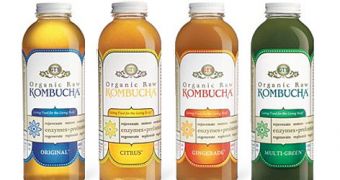Shortly after being found in violation of her parole and being ordered to wear at all times a SCRAM bracelet (an alcohol monitoring ankle device), Lindsay Lohan was spotted on at least a couple of instances carrying what looked like a bottle of Kombucha tea. As per reports, the actress had decided to give the beverage a try as she’d heard that it would help her detox and overcome her addiction to alcohol. That may not necessarily be so, experts cited by the Daily Mail say.
As we also noted shortly after Lindsay was photographed with the bottle of tea, not all the health benefits attributed to Kombucha are necessarily based on actual facts. Those who commercialize it say that it can work for a wide range of affections and conditions, including purifying the organism by detoxifying it, helping with weight loss, offering a boost of energy and even cure insomnia and indigestion. Many of these claims have no factual fundament whatsoever, experts say for the Mail – but that’s not stopping more and more people from buying it.
“Experts claim that the high numbers of bacteria give the immune system an energy boost which helps the body get rid of harmful toxins. Although the health benefits have not been scientifically proven, many regular drinkers claim to have been cured of ailments including arthritis pain, indigestion, kidney stones, eczema and insomnia. It has also been credited with helping treat more serious illnesses such as cancer, high blood pressure and even improving failing eyesight. The tea is thought to boost the body’s metabolism which can help weight loss – some people claim to have shed as much 30lb. But health experts warned that people should be cautious as little is known about the benefits or risks of the tea,” the Mail writes.
“Until more is known about both the health benefits and harmful effects surrounding this type of tea, consumption should be viewed with caution. There is little scientific evidence available in the literature to support the beneficial effects of this tea,” Dr. Emma Williams of the British Nutrition Foundation says for the same publications. Those who choose to make Kombucha in their home, as opposed to buying it from a store, are at an even greater risk because no one can predict how the bacteria will act.
Kombucha is tea that also contains a solid mass of yeast and bacteria, which is usually kept to ferment for about a week in a ceramic container. It may also contain traces of alcohol, which is produced by the bacteria in it. It may have unpleasant side-effects, ranging from a certain feeling of light-headedness to severe diarrhea, nausea and rashes.
Follow me on Twitter @ElenaGorgan

 14 DAY TRIAL //
14 DAY TRIAL //